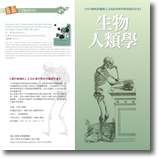已執行計畫 / 生物人類學
生物人類學
| 所屬學門 | 人類學 |
|---|---|
| Project Discipline | Anthropology |
| 計畫名稱 | 生物人類學 |
| Project Title | Bioanthropology |
| 計畫主持人 | 邱鴻霖 |
| PI | Hung-Lin Chiu |
| 共同主持人 | 李匡悌 、林福仁 |
| co-PI | Kuang-Ti Li, Fu-Ren Lin |
| 執行單位 | 清華大學人類學研究所 |
| Institution/Department | Institute of Anthropology, NTHU |
| 執行期限 | 06/01/2013~05/31/2014 |
| Project Period | 06/01/2013~05/31/2014 |
| 計畫書目 | 連結 |
| Book List | Link |
| 計畫簡介 | 近年來「生物人類學」的發展,隨著生命科學技術的發達而順竿上爬,是當今國際 人類學界蓬勃發展中的一個學門,舉凡國際知名科學期刊中的人類學相關之研究大多都 與「生物人類學」有關。許多人類學教科書中甚至已經將美國人類學傳統四大分支中的 「體質人類學」以「生物人類學」這個術語(term)加以置換,以跳出傳統的體質人類學 只強調人類演化與體質形態學研究的窠臼。換言之,凡與人類社會文化發展、生存適應 相關的「生物」議題,可說是不論古、今皆納入了「生物人類學」的領域之中,此舉更 加符合「人類學」學門之理念與定義。生物人類學跳脫出傳統體質人類學與人種演化學, 更包括了當代與古代的考古材料相關的研究如:法醫人類學、植物(農業)考古學、動物 考古學、民族植物學,甚至是當代顯學「分子遺傳學」以及地球科學界的「微量元素分 析」等, 都成為生物人類學的研究範圍。 然而,國內在這個研究領域上仍處於萌芽階段,國際上生物人類學研究正勢如破竹 地蓬勃發展中,而台灣幾乎無法與接軌;其關鍵的因素除了人才不足之外,硬體與圖書 資源的不足亦是主要的因素之一。清華大學多年來在理工、生命科學、原子能科學學門 上的教育研究基礎亦是國內頂尖的大學之一,更成為有利於促進「跨領域研究」的發揮 場域,期待能透過生物人類學圖書的購置,使人文社會科學與自然科學在研究課題的開 發與教育訓練上,有更密切的合作與拓展。基於以上考量,生物人類學必須在這些研究 中扮演重要的角色,清華大學是台灣人類學的研究重鎮之一,透過國科會的支持於國立清華大學圖書館專案購置生物人類學相關圖書設備資源,不僅是國內的創舉,更將因此為台灣生物人類學發展奠下良好的基礎。 |
| Introduction | In recent years the development of biological anthropology has flourished within the life sciences and anthropological disciplines, it has become an internationally recognized field of study with publications in major scientific journals and an abundance of highly regarded textbooks. Many anthropology textbooks recognize the four traditional classification of Anthropology, which include the subdivision of physical/ biological anthropology, this ‘term’ can be miss-represented to emphasize traditional aspects which only stress the human/primate stereotypical features of evolution and physical morphology. But the field of biological anthropology also contains "bio-archaeology" a subject more in line with the concept and definition of anthropology disciplines, traditional research areas such as ethnic origins, material culture, agriculture, , paleoethnobotany, archaeobotany, zooarchaeology, along with cross-discipline studies such as molecular genetics, developed by the life sciences community, and trace element analysis developed by the Earth science community. Currently, the Institute of Anthropology requires a relatively small number of "biological anthropology" core classes for its Masters and Doctoral program, domestically this field of research is still in its infancy and has not developed over the last two decades when compared at an international level. The key factors for this under development are lack of talent, lack of related materials and lack of library resources. In the context of Tsinghua University, which has a reputation for science and engineering research, as well as a reputation for promoting interdisciplinary research, the disciplines of humanities and the social sciences have not developed to the same degree. This level of cross-study cooperation within the University can be promoted and stimulated through the acquisition of biological anthropological resources, the expansion of the research topics and training, and closer cooperation with other disciplines. Based on the above considerations, biological anthropology should play a more important role in the studies of National Tsinga Hua University Humanities and Social Sciences departments, and should be well represented in the books and publications found in its library. With Tsinghua University aspiring to become a center of anthropological research, it must have adequate library resources for these studies in biological anthropology. |

